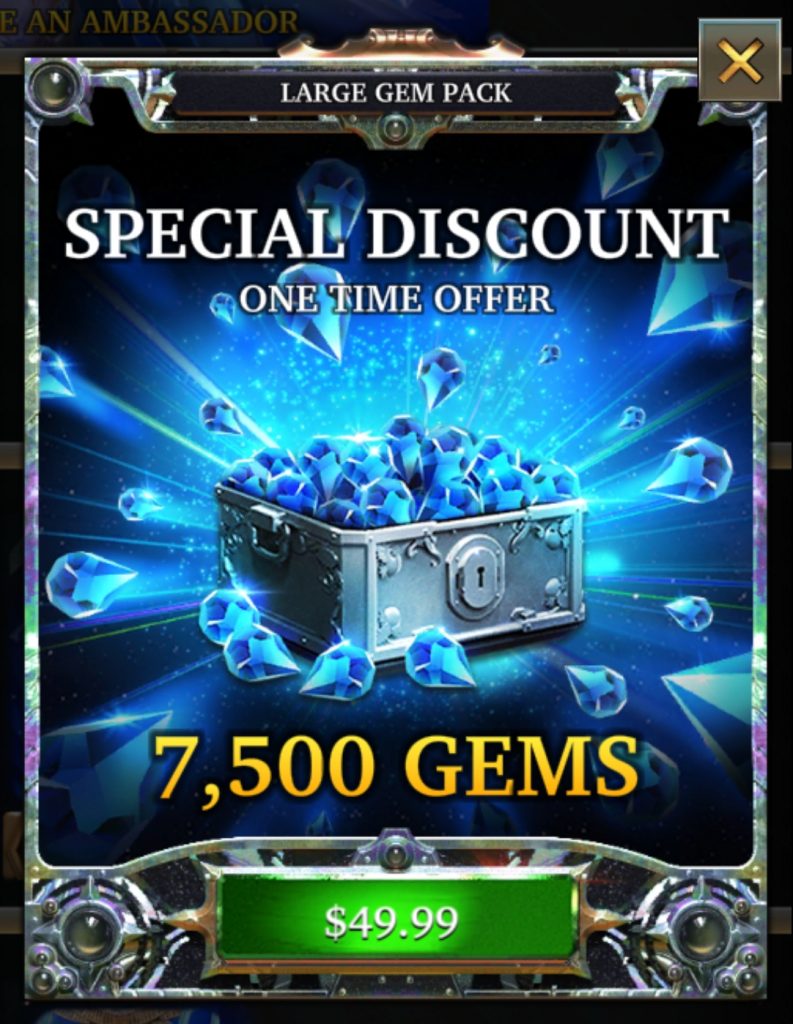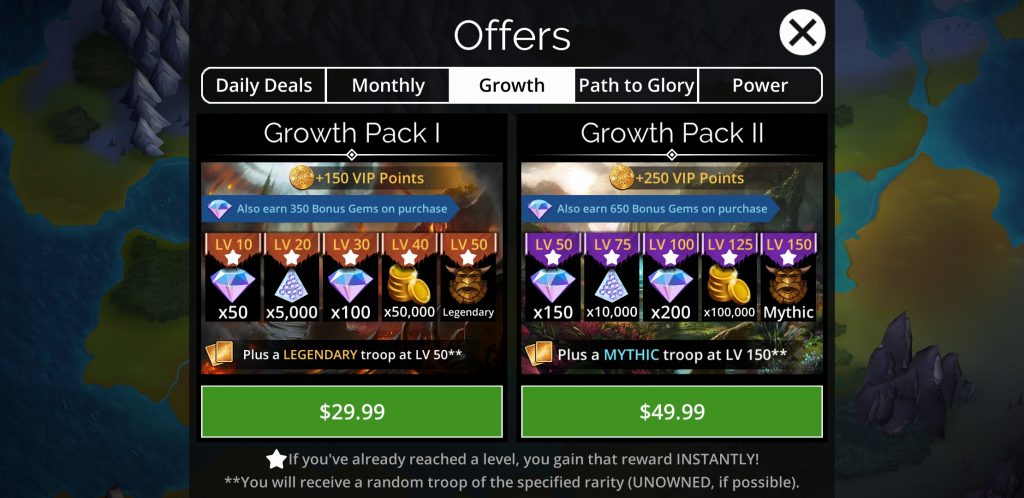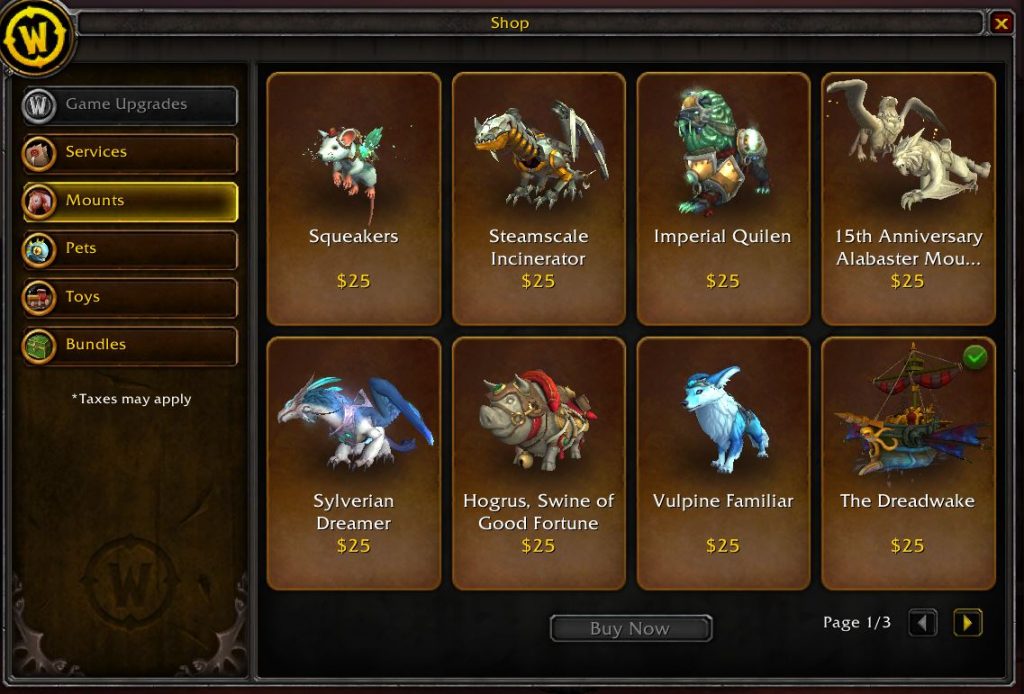
This one will probably end up being controversial. Some people consider a game pay to win (p2w) if there are any microtransactions built-in whatsoever. Others will argue against a game being p2w unless you’re able to buy a level of in-game power that you cannot earn in game. Of course, there is a whole spectrum in between those two extremes.
For our purposes, we’re going to let the idea of pay to win be incredibly broad, and then we’ll break down what that actually means to the player bit by bit. Buy to play – buying the box/license – is not pay to win because everyone must pay the same amount (ignore sales, etc) and gains no advantage in any scope of the game. Pay to play – such as with a subscription – is not pay to win, because again, everyone is paying and one player cannot necessarily pay more in order to gain advantage. Pay to win elements are present if a player can spend additional money to purchase something in game. However, it shouldn’t be said that the game is inherently pay to win because of this. Having elements of a thing, pieces of a thing, doesn’t mean the whole of the game is that. For example: a game could allow duels (PVP) and not be considered a PVP game, despite having a piece that is.
Pay for Power: The most commonly accepted definition of pay to win is paying for direct power increases. If you can swipe your card and put on sweet gear that helps you go kill the boss or other players, then it’s paying for power. This problem is infinitely worse if the BEST gear (or other form of power increase) comes from a cash shop. If you can buy, with money, your full scope of biggest power increases, then this is the maximum example of pay to win. Of course, there are still gradients to this. What if you can buy a best in slot item – but it’s only one of several pieces? Even pay for power still has a scale to it and arguments could be made that it isn’t pay to win if it doesn’t net you every result.
A simpler way to look at if a game is pay to win based on paying for power: If two players are of equal skill and time investment, but one can gain a competitive advantage by spending more money then it’s pay to win.
Additionally in the pay for power category are those games which let you buy chances for power – if that is the primary way of gaining power. Buying packs or other loot boxes that have a chance of giving you strong power gains is still paying for power, and therefore pay to win, even if it’s not 100% chance at that power gain.

Pay for Advantages: This area tends to be the most debated. I include it as a separate section, because this is a scope that some tend to argue is pay to win based on pay for power and others argue that it’s pay for convenience. This section is for games that allow you to pay for something that gives you an advantage towards gaining power. This includes games that give you bonus chances at loot that you otherwise have to earn (such as pay $5 to gain double drop rate for X hours/days). This also includes games that increase convenience to such an extent that it provides significant advantages in gaining power like things that speed up crafting, farming, or gold making if any of those functions can increase player power.
Paying for experience boosts and similar functions can fit into this category, depending on the goal of the game (and the goal of individual players). Right now, in World of Warcraft, you could go buy a max level character for real money in their cash shop… but I hesitate to call that gaining an advantage in power, because, for most, the game doesn’t really start until max level and all relevant power gains occur after that point.
Pay for Convenience: Most players I’ve talked with consider this business model to be not pay to win. As long as it doesn’t go so far as to provide a measurable advantage, at least. This includes quality of life things such as more storage space and skill tree pages (not more skills, just more ways to swap out skills quickly, such as in League of Legends). Some more contested things I put here are character slots and experience boosts. In most scenarios, having additional characters on the same account/server does not increase the power of the first one. Games, usually free to play ones, that sell character slots feel more like pay to play than pay to win, despite being a source of frustration for altoholics. As described above, xp boosts are a mixed bag. When it’s a game that all happens at max level OR that has a permanent max level in terms of most benefits, getting to that level faster is more convenience than power gains – so long as the boost isn’t available at the launch of said content. Getting a head start on content would definitely be an advantage and would fit into the above category.
Pay for Cosmetics: Companies wanting to open a cash shop and assure players that there’s no pay to win will always say “cosmetic only”. Of course, it doesn’t always turn out the way it was promised, but that’s a different issue. As with paying for convenience, most players – myself included – tend to look as cosmetic only microtransactions as acceptable and definitely not pay to win… but… this leads us to a different issue. What is winning? I have still heard complaints about cash shop cosmetics in two main formats. The first: “If I’ve paid (or am paying) for this game, they should include the cosmetics with that”. Particularly for those paying monthly subscriptions, seeing cosmetics you have to buy in addition can feel grating. Second: “The coolest cosmetics are the best rewards – I hate that someone can just spend $20 and get what I worked for.”

What is Winning?: I’ve heard people try to argue that there’s no such thing as pay to win because getting the gear doesn’t clear the content. Just because you have the best gear doesn’t mean you’re going to have the skill to clear the highest content. While, there is a sort of logic to that, it’s mostly a semantic issue. That’s why I defined pay to win the way I did up top. Past that though, pay to win can become a little vague because gaining an advantage over another player depends on the context in which you’re trying to compete. Pay to win doesn’t literally mean “beat the game”, because most games with this sort of microtransactions doesn’t have an ending. You cannot “win” World of Warcraft or League of Legends or Tap Titans 2 or many of the multitude of games with cash shops yet no winning. However, since player goals vary, win conditions vary, and what pay to win means is going to vary from person to person. Someone who wants the coolest mounts and outfits is going to care more about cosmetic “pay to win” than someone who is pushing high rated PVP content.
Direct vs Indirect: I wanted to mention this little side-thought because it’s been both an argument used by people defending a specific game AND by game developers trying to excuse loot box mechanics. Is it still pay to win if the item that is helping the winning NOT in the cash shop? Yes. Yes it is. If you use cash to buy gems or diamonds or whatever premium currency on your mobile game and use those gems to buy your packs, or boxes, or direct upgrades then you totally spent money for those things. It makes no effective difference if you buy a sub-currency or not. The same applies if you spend money to buy in game currency and then use that currency to buy gear off the auction house or other in-game items and services. That disconnect doesn’t change the result. When doing reviews of this, I’ll try to note the differences, but it won’t likely affect the evaluation of the game.
Last Word: Naturally, there are more examples than any number I could list here and most of what I’ve said could have exceptions in certain games. Each game with any pay to win elements has to be considered in the context of that game, the win conditions of that game, the desires of the player base as a whole and potential interests of individual players.
Finally, just because a game is determined to have pay to win elements doesn’t inherently make it a bad game. P2W typically has a very negative connotation, and while I personally don’t approve of games that have expansive cash shops, even I can enjoy playing them casually sometimes.
Have something to say about it? Leave a comment. Subscribe, favorite, etc, if you want to see what we have to say about future games and if they are Pay to Win.
3 thoughts on “Is It Pay to Win?: Defined”